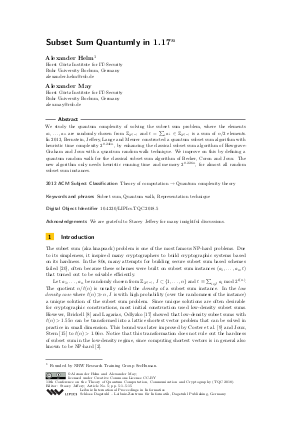Subset Sum Quantumly in 1.17^n
Authors Alexander Helm, Alexander May
-
Part of:
Volume:
13th Conference on the Theory of Quantum Computation, Communication and Cryptography (TQC 2018)
Part of: Series: Leibniz International Proceedings in Informatics (LIPIcs)
Part of: Conference: Conference on the Theory of Quantum Computation, Communication and Cryptography (TQC) - License:
 Creative Commons Attribution 3.0 Unported license
Creative Commons Attribution 3.0 Unported license
- Publication Date: 2018-07-16
File

PDF
LIPIcs.TQC.2018.5.pdf
- Filesize: 0.55 MB
- 15 pages
Document Identifiers
Subject Classification
ACM Subject Classification
- Theory of computation → Quantum complexity theory
Keywords
- Subset sum
- Quantum walk
- Representation technique
Metrics
- Access Statistics
-
Total Accesses (updated on a weekly basis)
0Document
0Metadata
Abstract
We study the quantum complexity of solving the subset sum problem, where the elements a_1, ..., a_n are randomly chosen from Z_{2^{l(n)}} and t = sum_i a_i in Z_{2^{l(n)}} is a sum of n/2 elements. In 2013, Bernstein, Jeffery, Lange and Meurer constructed a quantum subset sum algorithm with heuristic time complexity 2^{0.241n}, by enhancing the classical subset sum algorithm of Howgrave-Graham and Joux with a quantum random walk technique. We improve on this by defining a quantum random walk for the classical subset sum algorithm of Becker, Coron and Joux. The new algorithm only needs heuristic running time and memory 2^{0.226n}, for almost all random subset sum instances.
Cite As Get BibTex
Alexander Helm and Alexander May. Subset Sum Quantumly in 1.17^n. In 13th Conference on the Theory of Quantum Computation, Communication and Cryptography (TQC 2018). Leibniz International Proceedings in Informatics (LIPIcs), Volume 111, pp. 5:1-5:15, Schloss Dagstuhl – Leibniz-Zentrum für Informatik (2018)
https://doi.org/10.4230/LIPIcs.TQC.2018.5
BibTex
@InProceedings{helm_et_al:LIPIcs.TQC.2018.5,
author = {Helm, Alexander and May, Alexander},
title = {{Subset Sum Quantumly in 1.17^n}},
booktitle = {13th Conference on the Theory of Quantum Computation, Communication and Cryptography (TQC 2018)},
pages = {5:1--5:15},
series = {Leibniz International Proceedings in Informatics (LIPIcs)},
ISBN = {978-3-95977-080-4},
ISSN = {1868-8969},
year = {2018},
volume = {111},
editor = {Jeffery, Stacey},
publisher = {Schloss Dagstuhl -- Leibniz-Zentrum f{\"u}r Informatik},
address = {Dagstuhl, Germany},
URL = {https://drops.dagstuhl.de/entities/document/10.4230/LIPIcs.TQC.2018.5},
URN = {urn:nbn:de:0030-drops-92527},
doi = {10.4230/LIPIcs.TQC.2018.5},
annote = {Keywords: Subset sum, Quantum walk, Representation technique}
}
Author Details
Funding
- Helm, Alexander: Founded by NRW Research Training Group SecHuman.
References
-
Dorit Aharonov, Andris Ambainis, Julia Kempe, and Umesh Vazirani. Quantum walks on graphs. In Proceedings of the thirty-third annual ACM symposium on Theory of computing, pages 50-59. ACM, 2001.

-
Miklós Ajtai. The shortest vector problem in l2 is np-hard for randomized reductions. In Proceedings of the thirtieth annual ACM symposium on Theory of computing, pages 10-19. ACM, 1998.

- Andris Ambainis. Quantum walk algorithm for element distinctness. SIAM J. Comput., 37(1):210-239, 2007. URL: http://dx.doi.org/10.1137/S0097539705447311.
-
Per Austrin, Mikko Koivisto, Petteri Kaski, and Jesper Nederlof. Dense subset sum may be the hardest. arXiv preprint arXiv:1508.06019, 2015.

-
Anja Becker, Jean-Sébastien Coron, and Antoine Joux. Improved generic algorithms for hard knapsacks. In Annual International Conference on the Theory and Applications of Cryptographic Techniques, pages 364-385. Springer, 2011.

-
Daniel J Bernstein, Stacey Jeffery, Tanja Lange, and Alexander Meurer. Quantum algorithms for the subset-sum problem. In International Workshop on Post-Quantum Cryptography, pages 16-33. Springer, 2013.

- Daniel J. Bernstein, Stacey Jeffery, Tanja Lange, and Alexander Meurer. Quantum Algorithms for the Subset-Sum Problem, pages 16-33. Springer Berlin Heidelberg, Berlin, Heidelberg, 2013. URL: http://dx.doi.org/10.1007/978-3-642-38616-9_2.
-
Ernest F Brickell. Solving low density knapsacks. In Advances in Cryptology, pages 25-37. Springer, 1984.

-
Matthijs J Coster, Brian A LaMacchia, Andrew M Odlyzko, and Claus P Schnorr. An improved low-density subset sum algorithm. In Workshop on the Theory and Application of of Cryptographic Techniques, pages 54-67. Springer, 1991.

-
Sebastian Faust, Daniel Masny, and Daniele Venturi. Chosen-ciphertext security from subset sum. In Public-Key Cryptography-PKC 2016, pages 35-46. Springer, 2016.

-
Zvi Galil and Oded Margalit. An almost linear-time algorithm for the dense subset-sum problem. SIAM Journal on Computing, 20(6):1157-1189, 1991.

-
Lov K Grover. A fast quantum mechanical algorithm for database search. In Proceedings of the twenty-eighth annual ACM symposium on Theory of computing, pages 212-219. ACM, 1996.

-
Ellis Horowitz and Sartaj Sahni. Computing partitions with applications to the knapsack problem. Journal of the ACM (JACM), 21(2):277-292, 1974.

-
Nick Howgrave-Graham and Antoine Joux. New generic algorithms for hard knapsacks. In Annual International Conference on the Theory and Applications of Cryptographic Techniques, pages 235-256. Springer, 2010.

-
Antoine Joux and Jacques Stern. Improving the critical density of the lagarias-odlyzko attack against subset sum problems. In International Symposium on Fundamentals of Computation Theory, pages 258-264. Springer, 1991.

- Ghazal Kachigar and Jean-Pierre Tillich. Quantum information set decoding algorithms. CoRR, abs/1703.00263, 2017. URL: http://arxiv.org/abs/1703.00263,
-
Jeffrey C Lagarias and Andrew M Odlyzko. Solving low-density subset sum problems. Journal of the ACM (JACM), 32(1):229-246, 1985.

-
Vadim Lyubashevsky, Adriana Palacio, and Gil Segev. Public-key cryptographic primitives provably as secure as subset sum. In Theory of Cryptography Conference, pages 382-400. Springer, 2010.

-
Frédéric Magniez, Ashwin Nayak, Jérémie Roland, and Miklos Santha. Search via quantum walk. SIAM Journal on Computing, 40(1):142-164, 2011.

-
Andrew M Odlyzko. The rise and fall of knapsack cryptosystems. Cryptology and computational number theory, 42:75-88, 1990.

-
Richard Schroeppel and Adi Shamir. A T=O(2^n/2). SIAM journal on Computing, 10(3):456-464, 1981.

